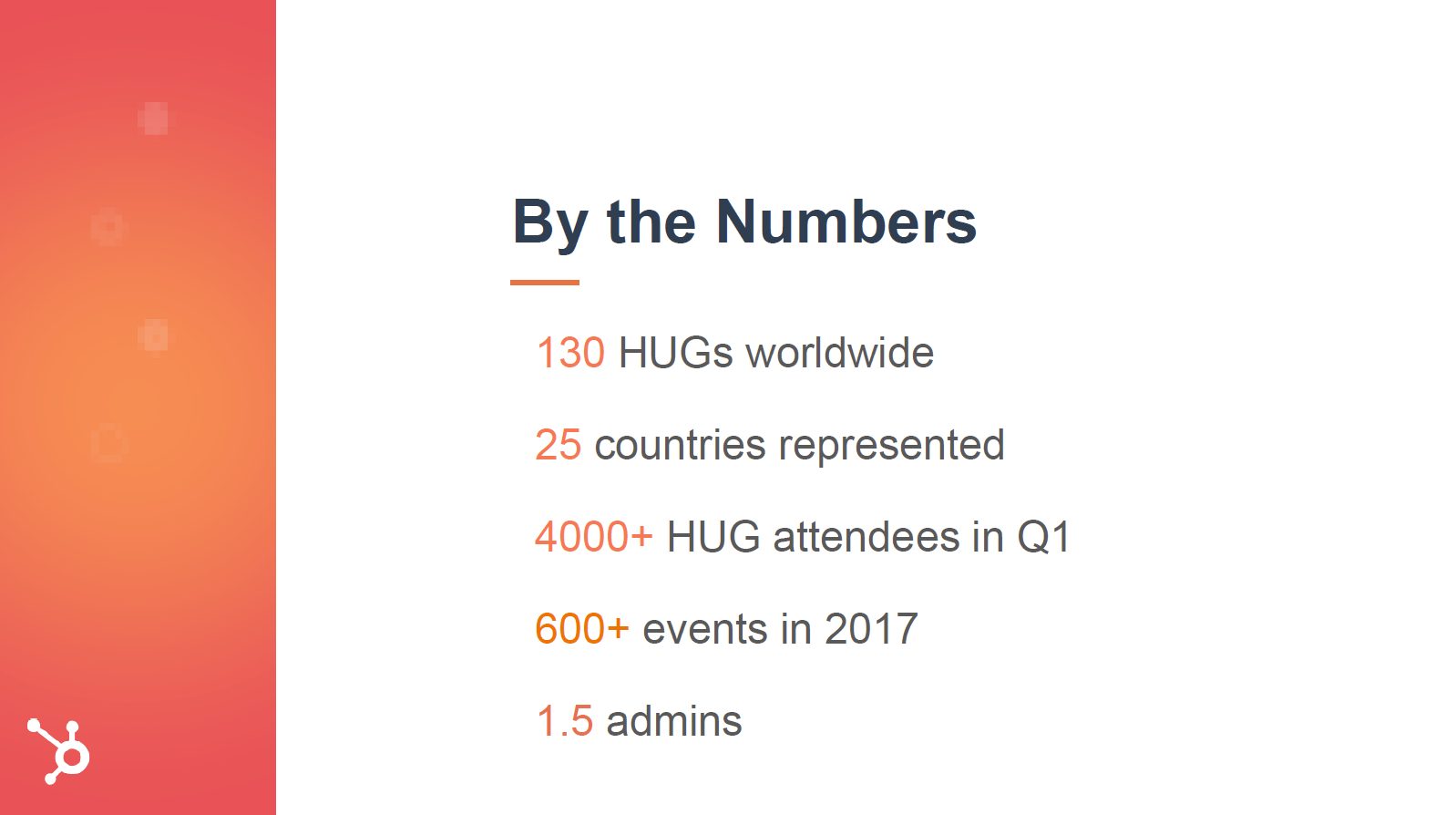How HubSpot uses HubSpot for promoting HUGs [Video]
- Home
- How HubSpot uses HubSpot for promoting HUGs [Video]
This is a transcript of the talk given by Juliana Nicholson from HubSpot at the HubSpot User Group Meeting in June 2018 in London.
What are the HUGs?
I've been at HubSpot for about three years. I was a customer before that and work out of our Boston main headquarter office. There's about 130 HUGs as the program stands today. I'll go a little bit more into that. It's my first time in London. It's been a great trip so far. I've done fish and chips pubs. If you have any more recommendations for me, please do let me know in one of the breaks.
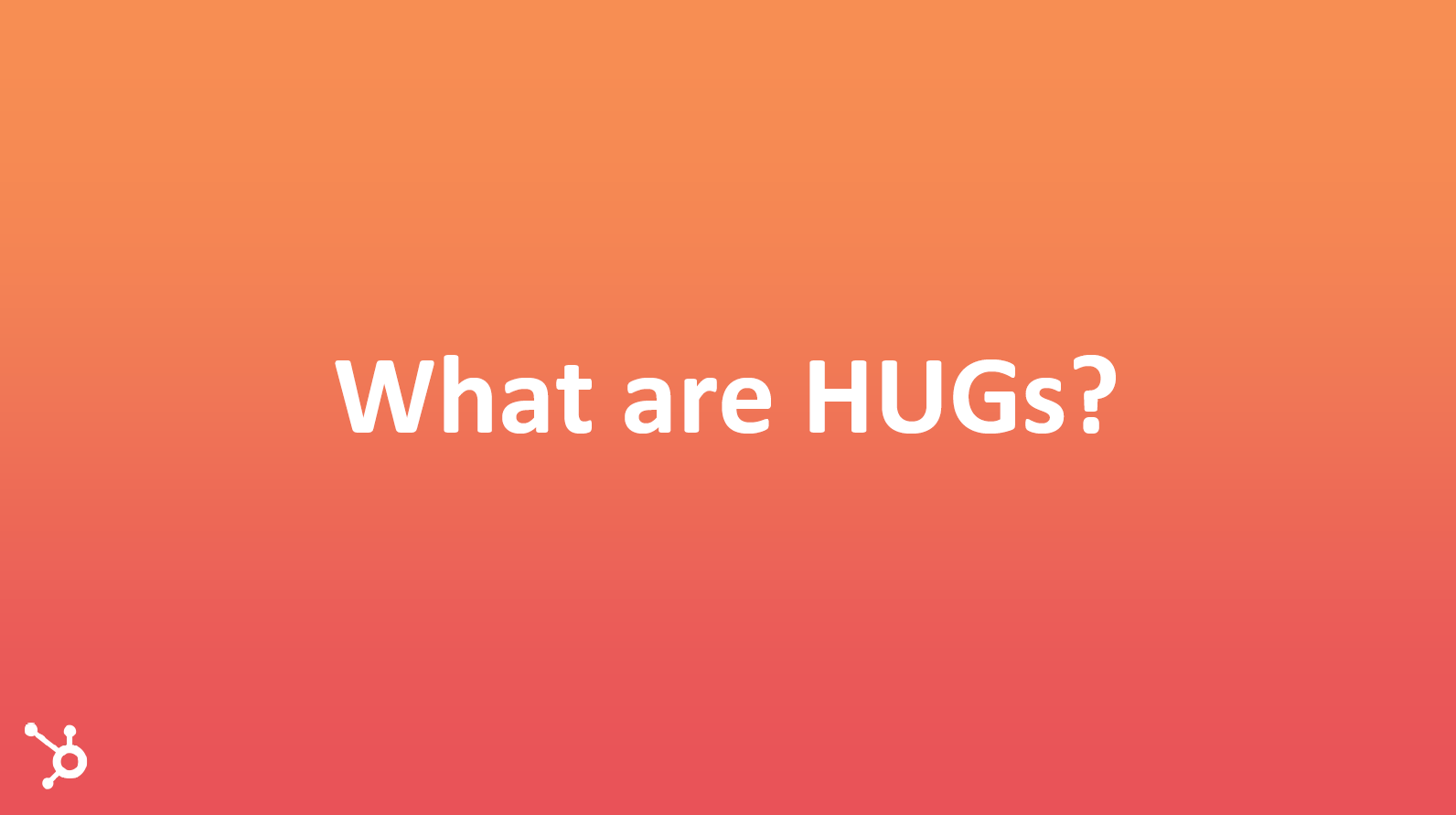
So a lot of you know, what HUGs are, but just to make sure we're on the same page about not just what this event is, but about what the HubSpot User Group program is as a whole.
"HubSpot User Groups are meetups that happen at least quarterly. They're remain free of charge for users"
They are for free education and inspiration for HubSpot users and people who are learning. I'm interested in just learning more about HubSpot or marketing in general. They're all, for the most part, led by our brilliant partners like Clwyd and all those others, who stood in the room just a few moments ago. And they're actually managed out of HubSpot, so while we don't manage the individual events, those are run by HubSpot partners, the program as a whole lives out of HubSpot and we work with those partners to make sure that everyone who attends HUGs is having the best experience possible.
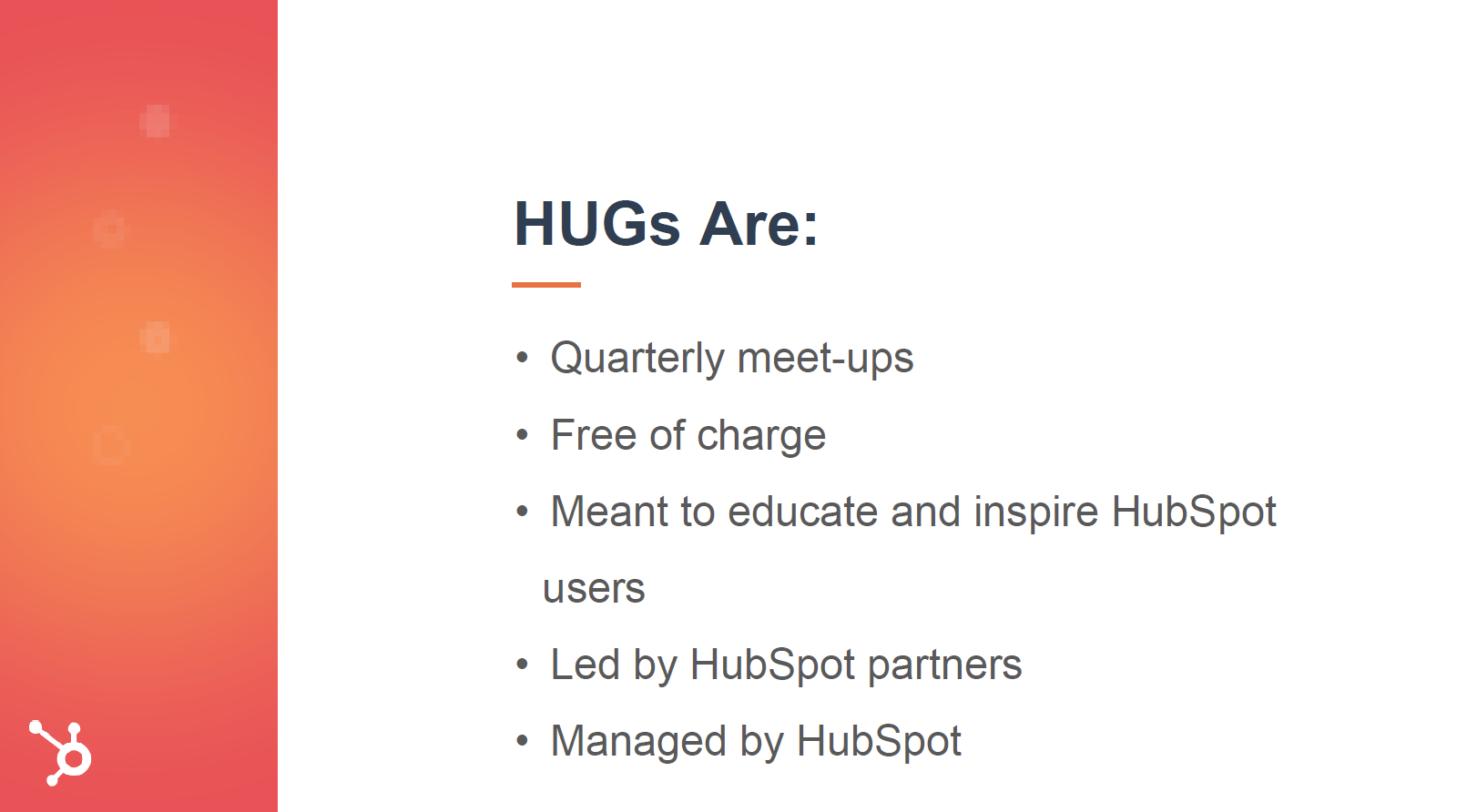
Like I said, there are 130 HUGs right now across the globe, from Boston to Bangkok. There's over 25 countries that we represent right now. There is meetup group with over 4,000 attendees happening in each quarter. There's over 600 events. We ran in 2017 and my favourite stat and the reason we're here today to chat is that there are what I call 1.5 people running the program out of HubSpot.
How HubSpot software allows all this
So how the heck do we run a program like that? You might say 130 meetups to one full time staff are like, that sounds like kind of a crazy equation. And in all reality it is, but we're able to use HubSpot software and a lot of automated processes to make the User Group event system possible. There's a few categories within, these are your program that I'd like to speak with you about today, specifically that are where we found ways to scale so that the 1:30 equation essentially works.
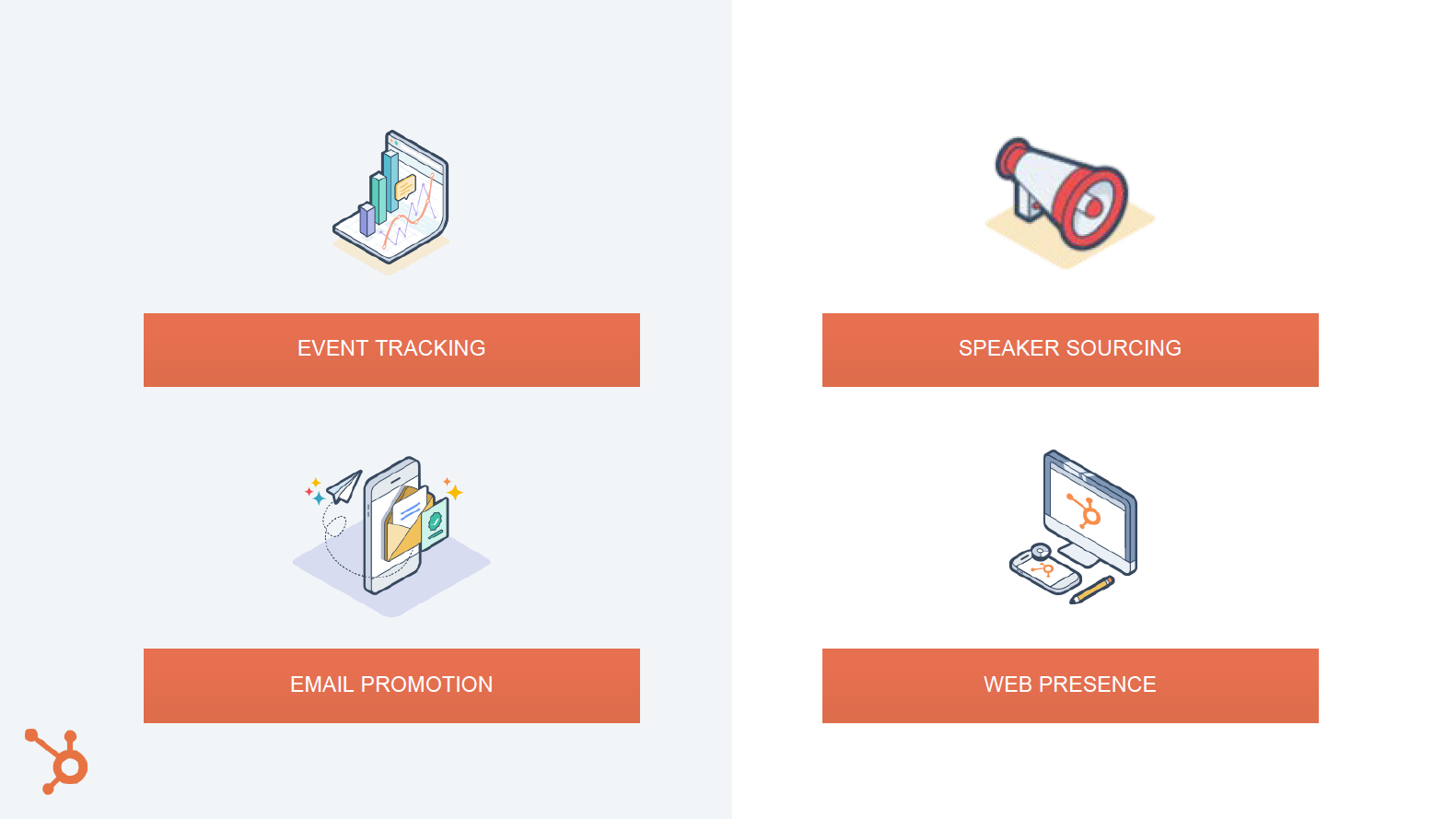
- The first is an event tracking. How does one person sitting in Boston know what events are going on, who's going to them when they're coming up, how do we actually track all that information and how do we do it in HubSpot right now?
- We also send speakers to HubSpot User Group, so sometimes our leaders have amazing connections in the city and they find their own speakers, but oftentimes we actually send HubSpotters to the events across the globe to do some speaking for the meetups ourselves. So how do we do that? How do we send people from our office to 25 different countries?
- Email promotion. How do we actually help people learn when events are coming up? Raise your hand if you've actually got an email invite from us telling you about this event today. Cool. So decent number of people. Again, how do we run that? 130 meetups for quarters and one person sitting in drafting 130 emails, that wouldn't quite work.
- And lastly, how do we create a web presence in a way that's fair and scalable for 130 events? And how do we do that out of HubSpot versus out of the actual event software that people would consider a traditionally created for that type of use?
1. Event tracking: how does it work?
So we'll start with the event or event tracking because after all, if you don't know what events are happening, you don't know much about your program. Before taking on the role of leading up HubSpot User Groups, which was about eight months ago, the program had been around for years. It was actually founded probably 7 years ago by people having informal meetups. It hubs about, didn't even know about, we finally caught wind that these User Groups were happening and said we should start supporting these.
And to do that, we set up what everyone set up for the first time: they try and organize anything Google forms, right? Like the most simple and easy thing to spin up. We had a Google form that said like: 'If you're hosting a User Group, let us know about it and we'll try and keep a track of it in a spreadsheet somehow". And so that quite frankly is how the program had run for five years and I'm sure there's a lot of you out there who are still running some sort of program through spreadsheets or through Google forms. And there's nothing wrong with that.
"When you have 130 events to manage - I hope will someday be 200 events -, it actually becomes a little bit of an issue. So what we said is: we need to assist them".
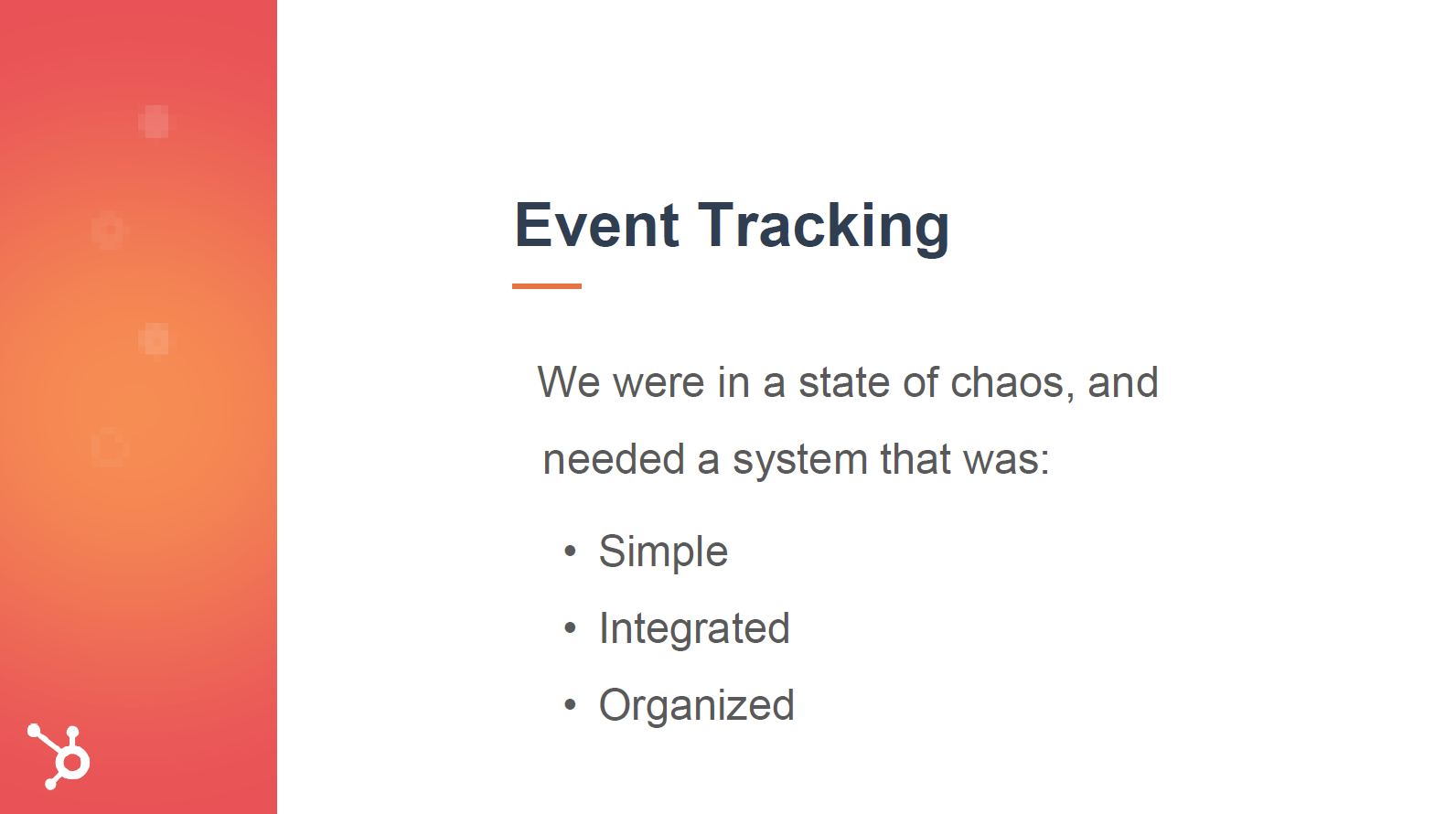
Those "simple, integrated, organized" for us to run this User Group program out of. And we also scratched our head and say: "Hey, I think we could actually do this with our own software". So the way that we run our User Groups right now, I don't know if you can see this, is actually through the HubSpot CRM.
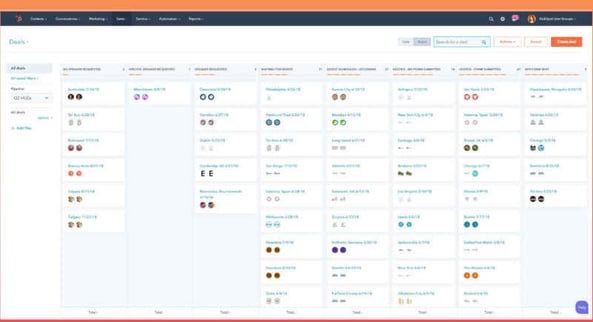
We have a form that our leaders fill out whenever they have a user coming up. We store all of our leader information in our CRM using custom properties. Now if you went and looked at post, Clwyd, and you'd see that he had a property next to him that says like he's a HUG leader. Yes, HUG city London, so you can actually store and manage all of our leaders out of our CRM now and when they have an event coming up, they can actually fill out a form for us in HubSpot. And the form workflows can create a deal in our CRM, so Clwyd says: "Hey, I want to host the south London HUG on the 26th". You filled out a form and a deal is actually created for me in our CRM that says: "This is Clwyd".
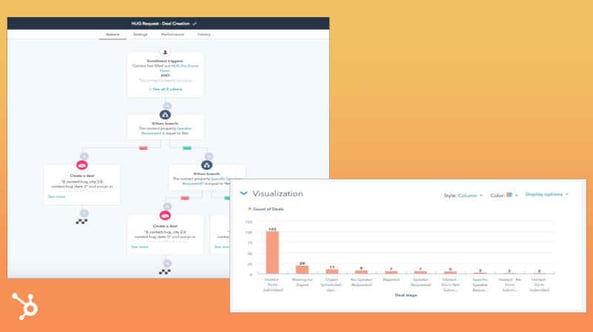
It's got an event coming up based on what he's filled out on that form. We know if he needs us to source speaker form or not. We know when the event is happening in as an Admin. I now have an organised board. All my events that are coming up that I can go in and look at an easily do reporting on. So if my boss comes to me and says: "How many User Groups are going on this quarter and what stages are they in?" My deal board tells that to me. I don't have a spreadsheet that I have to organise. I don't have dates that I have to manually change. I have it all in this information here. 
2. Speaker sourcing: the importance of automation
Like I said, closely tied to that is the problem of speaker sourcing. How do we actually fill out, how do we actually field requests for speakers from leaders? They tell us: "Hey, I have an event coming up in four weeks. I'd like someone to come speak at it". When we are managing the program out of Google sheets, this was a really big challenge for us. We had a column that quite literally was a question on a form that someone filled out that said: "Do you need a speaker for this event? Yes or not?" And we had a bunch of yeses. We had to go in, ask that person with that email address, who submitted that form, what type of speaker would you like, and then we had to go out and individually email people from the company and say: "Hey, do you want to go to speak at the London User Group? Should be cool..." It's a process that works well with 4 User Groups or 10 User Groups, but it doesn't scale for 130.
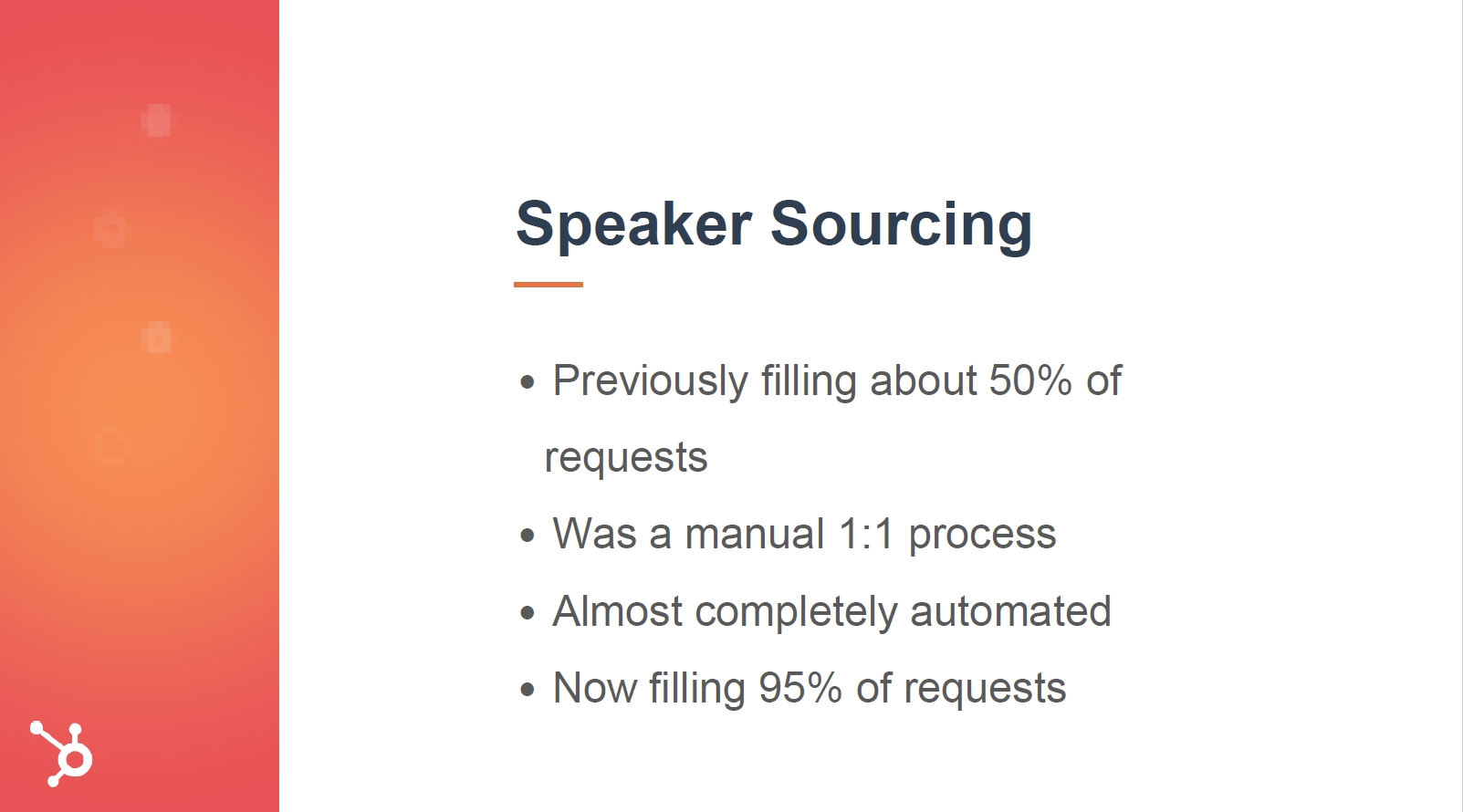
"So if you look at the program about a year ago, we were probably only filling about 50% of our speaker requests because we were such a manual process, we're sinking hours into it each week trying to play matchmaker".
That process now is almost completely automated and I'm really proud to say we're not there yet, but we filled about 95% of our requests automatically. The way that we do that, again, is through automation and integrations. So when leaders fill out that form, it tells us they have an event coming up. Not only do we create a deal for them in our CRM so that we can track it, we also send out notifications to our network at HubSpot, have speakers who might be interested in speaking at that event.
So at the beginning of the year we went out, we emailed HubSpot employees and said: "Would you be interested in speaking at a HUG at any point in this year if the right one came up, would you want to hop on a plane and go to Sweden?" And people said: "Yeah, of course I'd want to know about that, make it easy for me and I'll go speak for you".
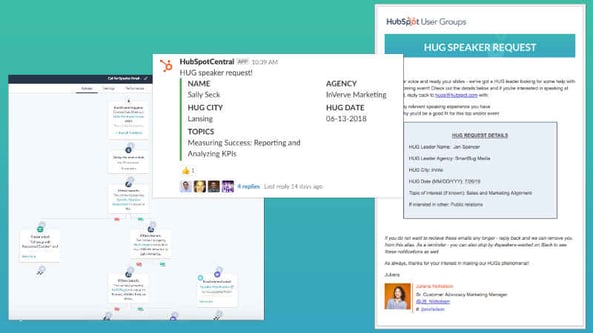
So when leaders fill out that form are telling us they have an event, we actually use an integration with Slack - now that is a HubSpot integration -, we send a notification to a specific "Speakers wanted" Slack channel, people right within that can reply it. They can claim that event and say: "Hey, I'd like to speak at that", and that's where probably 80% of our events sourced right now. Boom, right in real time. Someone's already hanging out on Slack, so your notification come up in the room. They can claim it and actually speak at a HUG event that easy. The speakers come to us now.
In addition, we also send an email out. We pull in all that information that leaders give us on the form, right into that email and we send it to an alias of all the people who raised their hand at some point and said: "Hey, I might want to speak it". And we also get a ton of responses to those, so we've gotten to a point now we're actually turning away speakers. We're saying: "Hey, we actually don't have any room for you left in this event, but we'll make an intro for the next event because we're no longer going out and a hounding people to speak events". We have automation doing that for us. We just have to do follow up. If you have any questions throughout, feel free to raise your hand. I'll also leave some time at the end and then I'll be wondering around state to dig into any of this during the breaks.
3. Email Promotion
So next it's email promotion. Again, 130 events, 1.5 admins - would probably be the interns -, let's say 1.5 admins doing email promotion... How do we make that work? So we actually sent out an email every time we had an event to promote, that would be a ton of email. People host 1 to 2 events per quarter, there'll be over 250 emails every six months, just dedicated to HUGs.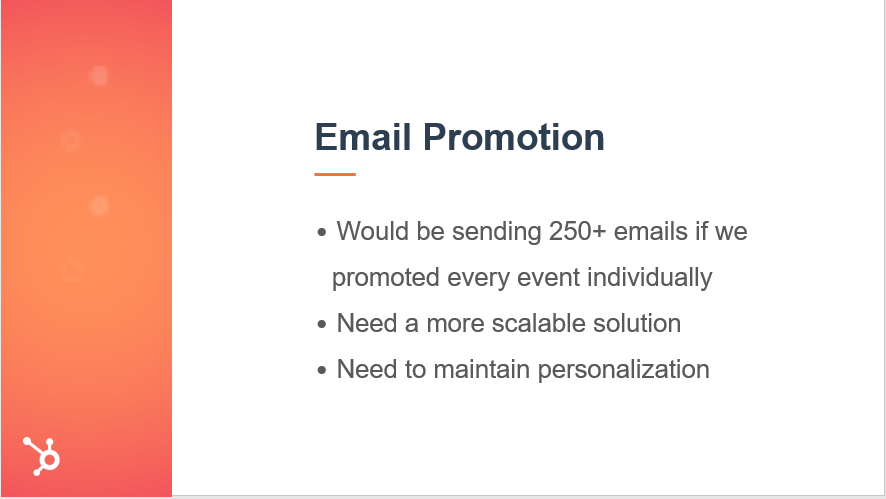
So we needed a more scalable solution to promote these events. And the same time we also needed to maintain personalisation. So what we first considered was: "Why don't we just put them all in a digest? Every month will list every event that's coming up in a digest and we'll send it out to our users. They can look for their city and they can sign up for that notification if they want him".
That actually failed terribly. We tried like two seconds of it and the registration number stunk. They were just garbage. And so we realised that people truly need personalisation with email. We've been saying this for years, we saw it right in front of our faces, when we took it away our results: "It's terribly". So we scratched our head and say: "All right, we have to keep these emails more personalised in the digest". But also we still don't want to send 130 of them a quarter. How do we do it?
We actually use smart content now so we have lists broken down by zip code or by people who've raised their hand.
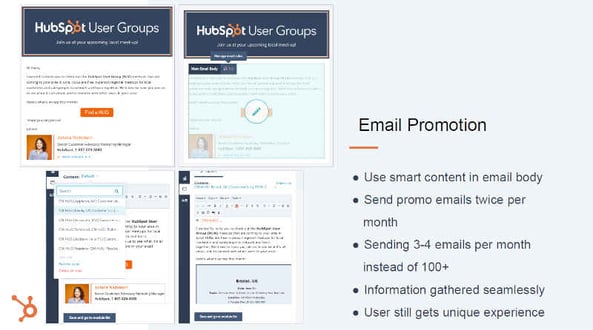
If you go to our website, you can actually request to be notified whenever a HUG comes to your city. So we have lists of people who said like: "Hey, whenever a London HUG comes up, tell me about it". And you also have lists of all of our users and customers who are in London who would be a good fit for HUGs, what we do is we build several emails each month. You can only have 20 smart body options per email. So we build as many emails as we need to swapping out the content and those emails with smart content. So we now send about 3 or 4 emails per month to promote 120-130 events just by swapping out the smart content in that body, for all of the different events that we have coming up.
"We send essentially one email per language. So we have an English speaking one, we have one for French speaking countries, we have one for Spanish speaking countries and this is how we do email promotion in a way that takes far less time and yet allows people to receive an email that looks like it's just for them because it has just the information for their city in it".
It's been a massive time saver and I'd say like consider the events that you guys have running a year officer. Consider the times you're sending 5 emails: you could be using smart content and said to just send one.
4. Web presence
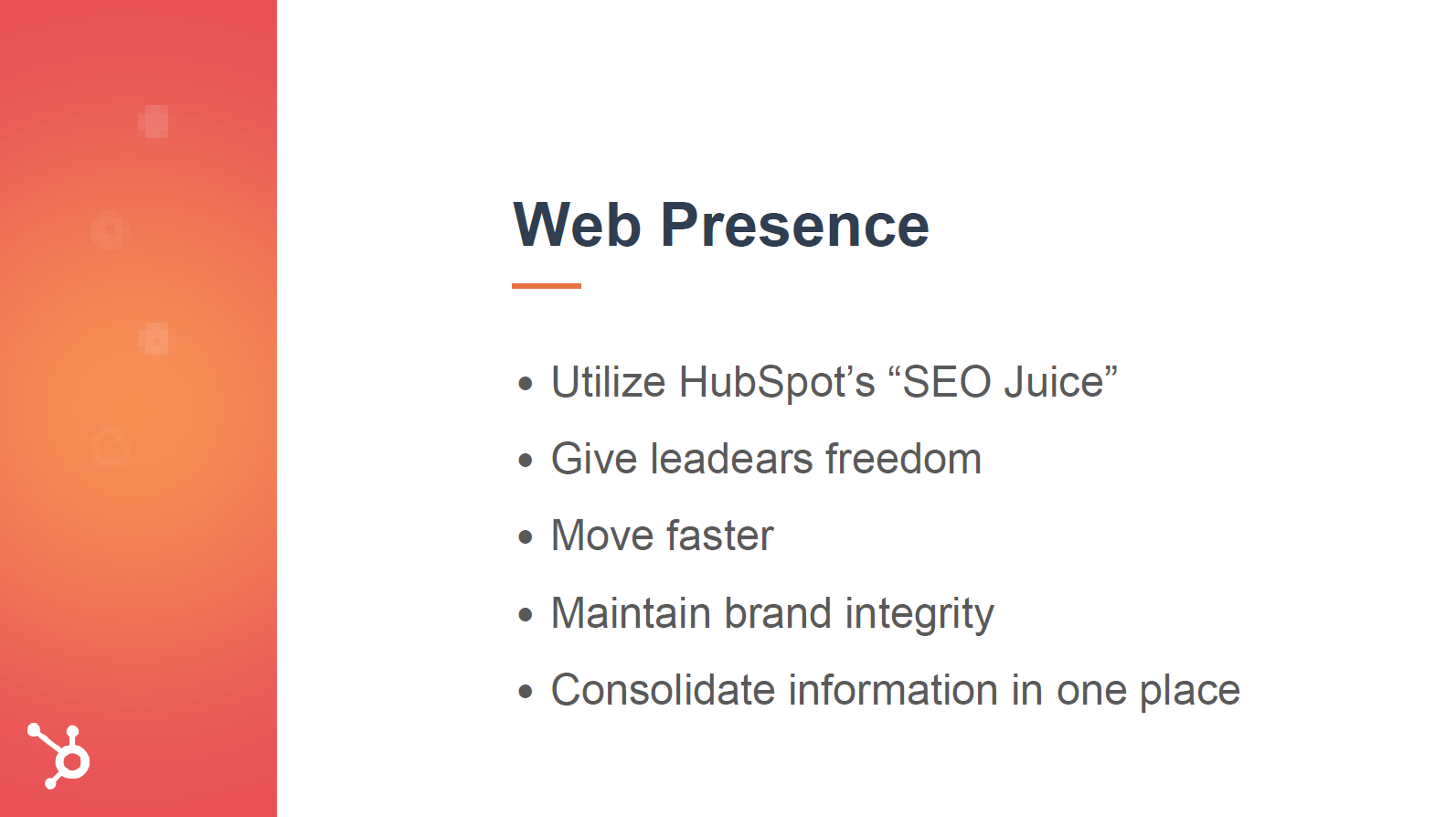
Last but not least, keep this moving because I know we have a ton of great content to go through today. I want to talk about how we use HubSpot's technology to create web presence for our HubSpot User Groups leaders. We wanted to do this in a way that still uses what I call HubSpot's SEO juice. That's just the fact that our website has pretty darn good SEO and that's because we have so many people who've been working on it forever; that like Google sees a domain from HubSpot and they're like: "Yeah, okay. It's probably pretty good".
"We wanted to take advantage of that SEO juice to help get HUG leaders events out there, but we also wanted to give HUG leaders freedom. We didn't want to say: "We're going to control everything you say about your HUG and you're going to have to wait on us to write about your HUG".
So we need something that helped us do that. They're like still move a little bit faster. We wanted it to feel on brand whenever HUG users are seeing, any HUG website, and we wanted to have information consolidated in one place wherever possible. So what we do is actually a dual solution approach.
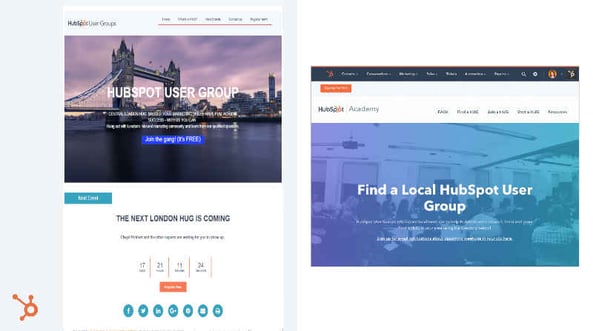
1. First and foremost, this page on the left probably looks pretty familiar to you. We've given every HubSpot User Group leader their own HubSpot portal, so they are able to manage and create their own mini-micro sites essentially through HubSpot. Outside of that, we also have a database on our own website with all of our HUGs events in it.
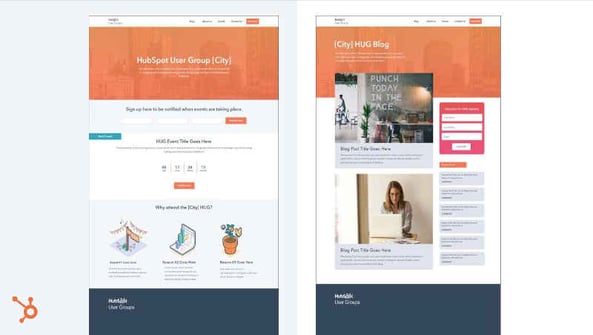
For the portals, essentially we give Hubs User Group leaders a portal - this as a sneak peek, but we actually have new templates that are going to be coming out for all of our HubSpot User Groups leaders, so that they don't have to build websites from scratch every time. They're going to get a template that they can click on, fill in some information, have a beautiful website supported by HubSpot. This is one super easy way that we found to facilitate leaders.
The other is by creating that beautiful portal that you saw that lives on HubSpot or that directory that lives on HubSpot. The beauty of hosting that HUG direct on HubSpot is, like I said, we get to capture people's attention from the web because we have powerful SEO as a company. But it also has a ton of really individual information for all of our HubSpot User Groups.
2. Instead of having a website where we have to manually go in and update every single one of those listings, every time you wanted updated, is that website is actually built using something called HubDB, which is a feature of HubSpot, any of you could go out and figure out how to use tomorrow.
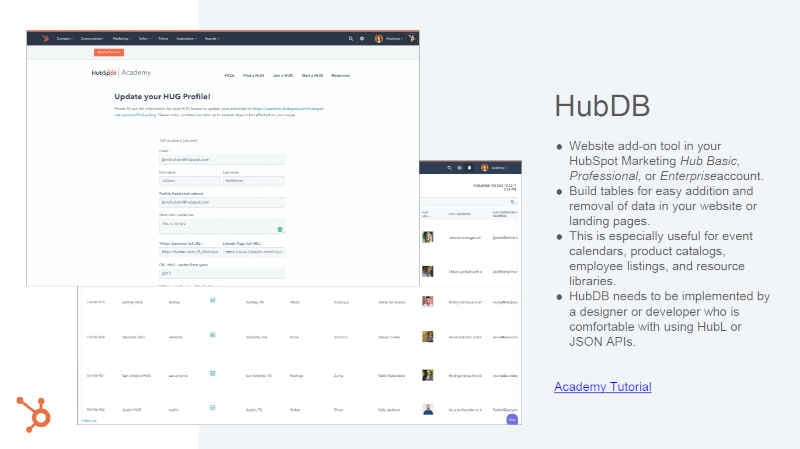
The way it works: HUG leaders can actually just fill out a form whenever they want their website updated and an admin (essentially me) on the back end essentially see it - it's the second screen on the slide up above, this kind of check mark admin screen. I can go in and spot check the information that they've given me, mark it off as active and that turn into a whole new listing on the directory profile. So it basically has given HUG leaders back the power to control the information that they see while allowing us to have a little bit of admin overview.
"Instead of creating a warming listing, writing everything from scratch and having one person managing that whole process, we've now basically a system of decentralised power with a little bit of admin approval and it moves remarkably fast".
The cool thing about that tool is that with HubDB, you can use one table and you can tie it into multiple things, so not only for HUG User Groups profiles updating. That information also is up over to a master event calendar that also lives on our website now, so HUG leaders get essentially dual promotion, for 2 minutes of work on their end and one second end work on ours.
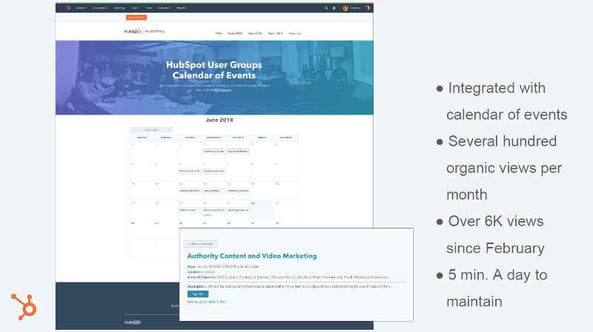
So far, like we just found this altogether up over maybe 6 months ago and we already have over 6,000 views. There's several hundred organic use coming in alone for this for a month, where we didn't even have an organic presence really for HUGs before that. And again, it's about 5 minutes of Admin time on our hand to manage. So, if you haven't looked into HubDB and you're a HubSpot user, see where you could check it out.
Like I said, this was going to be short and quick, I'll leave it over to Clwyd to talk to you a little bit more about SEO and the team from 23 to talk to you guys a little bit more about video. But I'll be around today if you have questions and I look forward to chatting with you all. And this is your first User Group, come back from more, and if it's your second or third or fourth, I'm glad to see you again. Thanks.
Resources
Download the March HUG 2018 slide presentations here
Other speeches from the same London HUG event
Inbound marketing strategy: How SEO and pillar pages really work (video and transcript), Clwyd Probert
Other relevant Blog posts
- Inbound Marketing Strategy: How to Align Sales and Marketing Teams
- The digital marketing world is changing. What will happen to HubSpot?
Next Steps
Now we would like to hear from you:
Have you ever used HubSpot platform? Have you ever attended an HUG event?
Either way, let us know by leaving a comment below right now.


